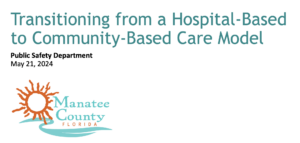The idea is to move away from overcrowded and costly emergency rooms.
By Tyler Oldano
Original Air Date: May 29, 2024
Host: Florida is among the five states with the highest percentage of people without health insurance. The cost of medical services is obviously a huge issue for those 12%-plus – and growing – Floridians that are uninsured. But the economic cost of people going without healthcare should concern everyone, and the taxpayer cost of people unnecessarily ending up in emergency rooms has now mobilized health administrators in Manatee County to come up with better solutions. Last week, Public Safety Department officials presented county commissioners with a new way of organizing healthcare in Manatee. WSLR’S Tyler Oldano comes to us with the proposed solution.

Ruiz
Mary Ruiz: We’ve got a substantial portion of our population who can’t afford to go to the doctor or dentist, and when they’re really sick, the only place they can go is the emergency room.
Tyler Oldano: Those are the words of Mary Ruiz. She’s the former CEO of mental health service provider Centerstone, and she sits on the board of directors for MCR Health, a non-profit with 48 locations in Manatee. She says that there’s a large amount of people who don’t have any health insurance coverage, which can make getting — and providing — medical care a challenge.

MCR walk-in clinic.
MR: So where do people turn? A working person is not going to be eligible for Medicaid, so there is about one out of five persons who fall within this zone of no coverage. If they cannot afford to buy coverage individually, they are not covered.
TO: If someone doesn’t have coverage, they often find themselves relying on the emergency room, which comes with its own list of issues. While patient care is guaranteed regardless of the ability to pay, according to Ruiz, for some it just isn’t the best option.
MR: The hospitals have become the option if all else fails, and so much has failed. But there’s another dynamic, there’s just not access to care.
TO: According to Ruiz, for mental health and addiction care, there’s a huge deficit between what’s offered and what’s needed. Not only can some patients not afford the long-term care they need, some emergency rooms may not even offer it.
MR: It’s also just not good care. If you have a chronic condition, and you get one-time stabilization, you’re just as sick as when you went in.
TO: Ruiz says there’s also an element of need. Some patients who rely on the emergency room for primary care come in with conditions that aren’t necessarily an emergency and can cause delay for those who need immediate treatment as the hospital tries to sort out the level of care each patient needs.
MR: All of us are suffering from this because we’re all going to experience greater ER waits because of the volume. Everybody loses. The hospital doesn’t get paid, the patient doesn’t get good care, and the rest of us are concerned about waits.

Cover of the presentation to Manatee County commissioners.
TO: It’s not supposed to be this way, though. Manatee County already had a plan for covering uninsured patients called the “Manatee County Healthcare Plan”. The plan tries to encourage patients to seek care outside of the emergency room, and, according to the website, the plan provides some level of coverage for primary and preventative care. But according to Health Information Services Manager Geoffery Cordes, 92% of the plan’s coverage overall was going to emergency rooms instead of the alternatives.
All of this was brought to the attention of Manatee County commissioners in a meeting last week. There, the Department of Public Safety proposed moving uninsured care away from relying on hospitals and putting more emphasis on community solutions, like health clinics and pharmacies.
These solutions already exist, with non-profits like MCR Health providing care for the community at a reduced rate. The Manatee Public Safety Department, though, wants local government to put more emphasis on those programs as the primary method of uninsured care.
Instead of patients going to the emergency room once an issue becomes apparent, the plan wants to put emphasis on screening and preventative treatment. Even if these programs are expanded to include things like same-day appointments or after-hour calls, Cordes says that it’s considerably cheaper than a visit to the ER.
Ruiz says that emphasizing community health is a step in the right direction.
MR: I think this is a very powerful concept of community-based care. I think it’s certainly doable by expanding the infrastructure that is available.
TO: Clinics aren’t the only aspect of community care, though. One of the solutions discussed by county commissioners at the meeting was increasing the availability of what they call “mobile solutions” that can provide treatment where patients need it most, or telehealth services that can provide limited assistance over the phone to patients with non-life threatening conditions, with the conversation mainly focused around making health services more available to those out in the community without relying on the ER.
In terms of cost, the Public Safety Department told commissioners they wouldn’t require any new funding from the county, and that funding would be reallocated from its hospital-based programs, and updating their patient eligibilty. They didn’t elaborate on their long-term goals like mobile care and no-cost clinics.
According to Ruiz, though, the solution to uninsured healthcare is something that must be systemic, rather than a single program.
MR: You have to change how the system of care works. The default function for how the system of care works can’t be the hospital, because that’s not the right place. It has to be, if you’re sick enough to be in the hospital. If you can avail yourself of these walk-in clinics, you have to change the system.
Reporting in Manatee County, Tyler Oldano, WSLR News.
WSLR News aims to keep the local community informed with our 1/2 hour local news show, quarterly newspaper and social media feeds. The local news broadcast airs on Wednesdays and Fridays at 6pm.